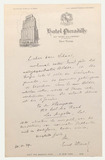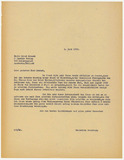Ernst Krenek
Seriöse Musik existiert einfach nicht für die breite Öffentlichkeit, weil niemand sie ihr zu Bewußtsein bringt. (...) Von fünfzig Artikeln über Musik widmet die „Time“ vielleicht einen der ernsten Musik, und auch das nur auf ihre spezielle, unseriöse Art. Das macht nichts, aber es paßt auch ins allgemeine Bild. Wir sind auf jeden Fall Ausgestoßene.
[For the broad public, serious music simply doesn’t exist, because no-one makes them aware of it. (...) Out of fifty articles in “Time”, perhaps one of them will be about serious music, and then only in their particular, frivolous manner. It doesn’t matter, but it conforms to an overall pattern. We are outcasts, certainly. (ed. trans.)]
The composer Ernst Krenek in his diary on 23 August 1941
| Born | on 23 August 1900 Vienna, Austria-Hungary |
|---|---|
| Died | on 22 December 1991 in Palm Springs (CA), USA |
| Exile | United States of America |
| Profession | Composer, Conductor, Musician |
Ernst Krenek had considered leaving Austria as early as 1935, when his play Karl V. failed to open in Vienna for political reasons. However Krenek remained in Austria and in 1937 he had the chance to travel to the USA at the invitation of the Salzburg Opera Guild. He returned from this tour in March 1938. On the day that German troops entered Austria Ernst Krenek was in Belgium. He was still on the road when he made plans for him and his wife to emigrate. In summer 1938 the pair reached the USA. Krenek started teaching music theory and composition in the private conservatorium of cellist Joseph Malkin, the same institute where composer Arnold Schönberg had given lessons in the early phase of his exile. Ernst Krenek received short-term support from the American Guild. From 1939 Krenek served as a professor at various universities. In 1945 he was granted US citizenship. In 1947 he moved to California permanently, where he came into contact with writer Thomas Mann and Arnold Schönberg.
During his exile Krenek composed pieces for practical use in lessons, as well as experimental works in which he employed the twelve-tone technique and developed new compositional methods.
Although regularly returned to Europe after the end of the Second World War, he could never decide on a definitive return. He died in 1991 in his house in Palm Springs, California.
Selected works:
Jonny spielt auf, op. 45 (Opera, 1925-1926)
Karl V., op. 73 (Oper, 1931-1933)
What Price Confidence? Op. 111 (Chamber opera, 1945)
Eight Column Line op. 85 (Music for ballet, 1939)
Konzert für Violine und Orchester, op. 29 (1924)
Sinfonien Nr. 1-5, op. 7, 12, 16, 113, 119 (1921, 1922, 1947, 1949)
Further reading:
Maurer Zenck, Claudia: Ernst Krenek – ein Komponist im Exil. Wien: Lafite Verlag 1980





